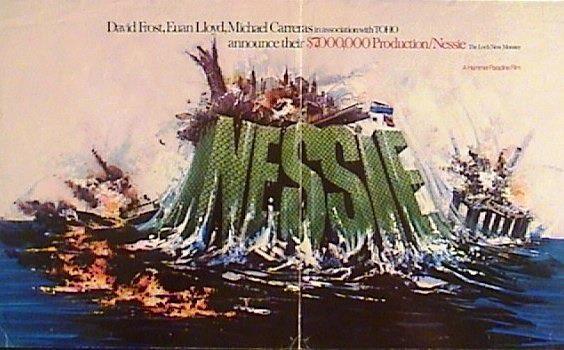
December 4, 2012

Nessie: The International Blockbuster Film We Never Saw
I have to tell you that we have irrefutable evidence that not only does the Loch Ness Monster exist, it is at present at large on the high seas.
-excerpt from the script of “Nessie”
In the 1970s, cryptozoology enjoyed a wave of popularity as the media sensationalized reports of real life monsters in television shows such as “In Search Of…” and theatrical documentaries like “The Mysterious Monsters”. While Bigfoot was the superstar of this era’s crypto-craze, the Loch Ness Monster had its own legion of fans fueled by decades of reports from its Scottish homeland. In addition to the documentary style offerings, there were also works of cinematic fiction in the subject of cryptids. Bigfoot and the Yeti already had numerous films made about them, many in the horror and exploitation genre. Nessie had a few weak films under her belt at this point, including “The Secret Of The Loch ” (1934) in which she was portrayed by a live iguana, and suffered further indignation by being the subject of the 1961 British comedy “What A Whopper!”.
By 1976, the legendary Hammer Films had a script for a new big budget horror film entitled “Nessie” starring the British Isles’ favorite kelpie cryptid. It seemed as though the Loch Ness Monster would finally earn respect as the star of her own horror film. It also didn’t hurt that “Jaws” was still on the minds of every moviegoer whenever they went near any large body of water.
The project would have been a huge undertaking, a joint production of Hammer Films, Columbia Pictures, and David Frost’s Paradine Productions. The special effects sequences were to be courtesy of Toho Co., Ltd., the studio responsible for Godzilla, Rodan, Mothra, King Ghidora, and numerous other giant monsters. The pairing of Hammer and Toho on the project seemed like any fantasy film fan’s dream come true, while Columbia gave the venture an air of mainstream respectability. Even though Hammer’s pedigree gave the project credibility with horror film buffs, the sad truth was that Hammer’s golden age was over and they were in dire financial trouble. Thanks to Columbia and Paradine, an initial budget of four million dollars was earmarked for the project. After a few other aborted productions such as “Vampirella”, this film was to be Hammer’s saving grace.
The script certainly sounded interesting, a hybrid of ecological parable and classic monster-on-the-loose elements therein. The script had Nessie growing to gargantuan proportions after being exposed to a toxic chemical called Mutane 4. The monster escapes the Loch and proceeds to attack a hovercraft and an oil rig while en route to a traditional Plesiosaur breeding ground in the South Pacific. Supposedly, screenwriter Chris Wicking got the idea for this homing instinct while doing research by reading Bernard Heuvelmans’ epic tome, “In The Wake Of The Sea Serpents”.
Meanwhile, thousands of miles away in Japan, work was being done on the special effects for the film. No stranger to the giant monster genre, Toho began to put its signature stamp on the project. The effects sequences were to be directed by Teruyoshi Nakano, who worked on the 70s Godzilla films up through the 1984 reboot of the franchise. Nakano learned the craft during the 1960s as assistant to special effects legend Eiji Tsuburaya, who was responsible for bringing all of the classic Toho monsters to life. Production design was handled by one of Toho’s masters, Yasuyuki Inoue, who was also a pillar of Toho’s special effects team. In his 2011 book, “The World Of Special Effects Art Design”, Inoue made public for the first time his sketches for the design of Nessie for the film.
Click image for full size version
Despite the efforts of the creative teams involved and a revised budget of seven million dollars, the project fell victim to several personnel shake-ups at Columbia. Principal photography was scheduled to commence on May 1, 1977. By the time stability had been restored to the studio, that date had come and gone. The new regime at Columbia had other priorities, and Hammer was struggling to stay alive. Toho moved on to its own productions. “Nessie” was subsequently cancelled.
For years after, there were rumors that Toho had used props produced for “Nessie” in a 1987 film entitled “Princess From The Moon”. While the monster that appeared briefly in the Japanese period piece did indeed look similar to Inoue’s production sketches, such a prop would definitely not be in any condition to be filmed, especially submerged in water, after so many years.
All that survives of “Nessie” are some advance promotional posters and press kits, along with Toho’s original production designs. There have been many motion pictures produced since then starring the Scottish Loch monster, but the unique script and the teaming of Hammer and Toho had the potential to be a very interesting film. Unfortunately for fans of cryptids and monster movies alike, “Nessie” would never see the light of day.
Mark Jaramillo
Bio:
Mark Jaramillo has been a lifelong enthusiast of Cryptozoology and monster movies with a special love for Japanese Science Fiction Cinema and Television. Field Research has included Bluff Creek and Boggy Creek, with Lochs Ness and Morar upcoming. He lives in Monrovia, California.
About Mark Jaramillo
Mark Jaramillo has been a lifelong enthusiast of Cryptozoology and monster movies with a special love for Japanese Science Fiction Cinema and Television. Field Research has included Bluff Creek and Boggy Creek, with Lochs Ness and Morar upcoming. He lives in Monrovia, California.
Filed under Cinema News, Cryptid Cinema, Cryptofiction, Cryptozoology, Giant Cryptid Reptiles, Lake Monsters, Loch Ness Monster, Movie Monsters, Photos, Pop Culture, Sea Monsters, Sea Serpents